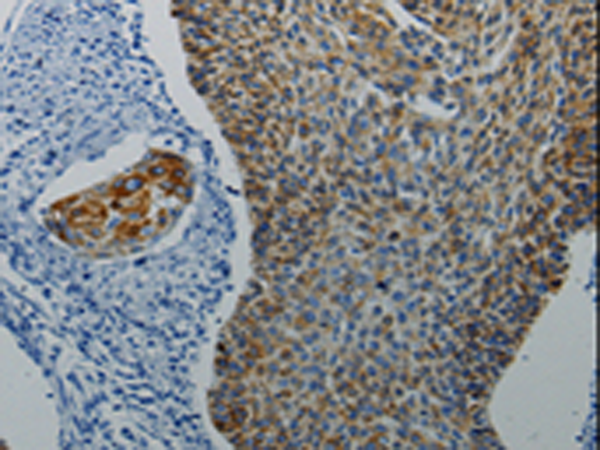

| WB | 1/500-1/1000 | Human,Mouse,Rat |
| IF | 咨询技术 | Human,Mouse,Rat |
| IHC | 1/50-1/100 | Human,Mouse,Rat |
| ICC | 技术咨询 | Human,Mouse,Rat |
| FCM | 咨询技术 | Human,Mouse,Rat |
| Elisa | 咨询技术 | Human,Mouse,Rat |
| Aliases | D4DR |
| WB Predicted band size | 48 kDa |
| Host/Isotype | Rabbit IgG |
| Antibody Type | Primary antibody |
| Storage | Store at 4°C short term. Aliquot and store at -20°C long term. Avoid freeze/thaw cycles. |
| Species Reactivity | Human, Mouse |
| Immunogen | Synthetic peptide of human DRD4 |
| Formulation | Purified antibody in PBS with 0.05% sodium azide and 50% glycerol. |
+ +
以下是3篇关于Rab5抗体的参考文献摘要示例:
---
1. **"Rab5 regulates motility of early endosomes on microtubules"**
*作者:Nielsen, E., Christoforidis, S., & Zerial, M.*
摘要:研究利用Rab5特异性抗体结合免疫荧光技术,揭示了Rab5通过调控分子马达蛋白的活性,控制早期内体在微管上的定向运动,影响内吞运输效率。
2. **"Monoclonal antibodies against Rab5 and Rab7 subtypes distinguish between perinuclear and peripheral endosomes"**
*作者:Bucci, C., Thomsen, P., & Wandinger-Ness, A.*
摘要:报道了针对Rab5和Rab7不同亚型的单克隆抗体的开发,通过免疫电镜和Western blot验证其特异性,证明Rab5抗体可特异性标记外周早期内体,区别于晚期内体定位的Rab7.
3. **"Rab5 modulates Aβ production by regulating BACE1 intracellular trafficking"**
*作者:Cataldo, A.M., Peterhoff, C.M., & Nixon, R.A.*
摘要:通过Rab5抗体免疫沉淀和siRNA干扰实验,发现Rab5过表达导致BACE1酶在内体异常滞留,促进β淀粉样蛋白(Aβ)生成,提示其在阿尔茨海默病中的病理作用。
---
以上文献均涉及Rab5抗体的实验应用,涵盖功能机制、抗体开发及疾病关联研究。如需具体发表信息,建议通过PubMed或SciFinder以标题及作者名检索。
Rab5 antibodies are essential tools in studying intracellular vesicular trafficking, particularly in early endosome dynamics. Rab5. a member of the Ras-related GTPase family, regulates membrane fusion, endocytosis, and organelle maturation. It exists in three isoforms (Rab5A, Rab5B, Rab5C) with overlapping yet distinct cellular roles. Antibodies targeting Rab5 are designed to detect specific isoforms or pan-Rab5. enabling researchers to investigate its spatial-temporal distribution, activation states (GTP-bound vs. GDP-bound), and interactions with effector proteins like EEA1 or Rabaptin-5.
These antibodies are widely used in techniques such as immunofluorescence, Western blotting, and immunoprecipitation to visualize endosomal compartments, track cargo transport, and study pathological conditions like neurodegenerative diseases or cancer metastasis. Polyclonal antibodies offer broad epitope recognition, while monoclonal versions ensure specificity. Validation often involves knockout cell lines to confirm target selectivity. Commercial Rab5 antibodies are typically raised in rabbits or mice, with applications spanning basic cell biology and clinical research. Recent studies also explore Rab5's role in viral entry (e.g., SARS-CoV-2) and autophagy regulation. Proper antibody selection depends on experimental needs, as isoform-specific localization varies—Rab5A predominantly in early endosomes, whereas Rab5C shows nuclear envelope association. Controls like GTPase activity assays often complement antibody-based findings.
×